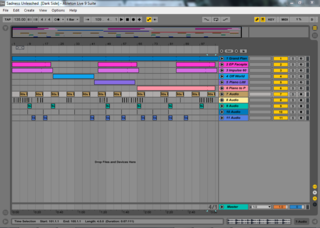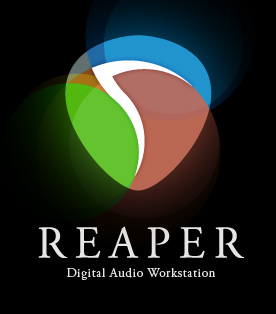
Reason is a digital audio workstation and audio plug-in developed by the Swedish company Reason Studios for macOS and Windows. The first version was released in 2000.

FL Studio is a digital audio workstation (DAW) developed by the Belgian company Image-Line. It features a graphical user interface with a pattern-based music sequencer. It is available in four different editions for Microsoft Windows and macOS.

Cubase is a digital audio workstation (DAW) developed by Steinberg for music and MIDI recording, arranging and editing. The first version, which was originally only a MIDI sequencer and ran on the Atari ST computer, was released in 1989. Cut-down versions of Cubase are included with almost all Yamaha audio and MIDI hardware, as well as hardware from other manufacturers. These versions can be upgraded to a more advanced version at a discount.

GarageBand is a software application by Apple for macOS, iPadOS, and iOS devices that allows users to create music or podcasts. It is a lighter, amateur-oriented offshoot of Logic Pro. GarageBand was originally released for macOS in 2004 and brought to iOS in 2011. The app's music and podcast creation system enables users to create multiple tracks with software synthesizer presets, pre-made and user-created loops, an array of various effects, and voice recordings.

A digital audio workstation is an electronic device or application software used for recording, editing and producing audio files. DAWs come in a wide variety of configurations from a single software program on a laptop, to an integrated stand-alone unit, all the way to a highly complex configuration of numerous components controlled by a central computer. Regardless of configuration, modern DAWs have a central interface that allows the user to alter and mix multiple recordings and tracks into a final produced piece.

Adobe Audition is a digital audio workstation developed by Adobe Inc. featuring both a multitrack, non-destructive mix/edit environment and a destructive-approach waveform editing view.

Ableton Live, also known as Live or sometimes colloquially as "Ableton", is a digital audio workstation for macOS and Windows developed by the German company Ableton.
Digital Performer is a digital audio workstation and music sequencer software package published by Mark of the Unicorn (MOTU) of Cambridge, Massachusetts for the Apple Macintosh and Microsoft Windows platforms.

Logic Pro is a proprietary digital audio workstation (DAW) and MIDI sequencer software application for the macOS platform developed by Apple Inc. It was originally created in the early 1990s as Notator Logic, or Logic, by German software developer C-Lab which later went by Emagic. Apple acquired Emagic in 2002 and renamed Logic to Logic Pro. It was the second most popular DAW – after Ableton Live – according to a survey conducted in 2015.

Sound Forge is a digital audio editing suite by Magix Software GmbH, which is aimed at the professional and semi-professional markets. There are two versions of Sound Forge: Sound Forge Pro 12 released in April 2018 and Sound Forge Audio Studio 13 released in January 2019. Both are well known digital audio editors and offer recording, audio editing, audio mastering and processing.

REAPER is a digital audio workstation, MIDI sequencer and video editing software application created by Cockos. The current version is available for Microsoft Windows, macOS, and Linux. REAPER acts as a host to most industry-standard plug-in formats and can import all commonly used media formats, including video. REAPER and its included plug-ins are available in 32-bit and 64-bit format.
Sonar was a digital audio workstation created by the former Boston, Massachusetts–based music production software company Cakewalk. It was acquired by Singaporean music company BandLab Technologies and renamed Cakewalk by BandLab.
Reason Studios is a music software company, based in Stockholm, Sweden. Founded in 1994, it develops the studio emulation digital audio workstation and audio plug-in Reason.

Overture is a music notation (scorewriter) program for Windows and Macintosh platforms, published and developed by Sonic Scores. While Overture is primarily a scorewriter program, it also allows editing the score's MIDI audio playback data in the manner of sequencer and digital audio workstation (DAW) software.

Nuendo is a digital audio workstation (DAW) developed by Steinberg for music recording, arranging, editing, and post-production. The package is aimed at audio and video post-production market segments, but also contains optional modules that can be used for multiple multimedia creation and audio sequencing.

MAGIX Samplitude/ Sequoia is a computer program made by MAGIX for recording, editing, mixing, mastering and outputting audio. The first version was released in 1992 for the Amiga and three years later for Microsoft Windows. The latest versions of the software are Samplitude Pro X5, Samplitude Pro X8 Suite and Sequoia 17. Samplitude is an example of a digital audio workstation (DAW).

Audio Random Access is an extension for audio plug-in interfaces, such as AU, VST and RTAS, allowing them to exchange a greater amount of audio information with digital audio workstation (DAW) software. It was developed in a collaboration between Celemony Software and PreSonus.

Studio One is a digital audio workstation (DAW) application, used to create, record, mix and master music and other audio, with functionality also available for video. Initially developed as a successor to the KRISTAL Audio Engine, it was acquired by PreSonus and first released in 2009 for macOS and Microsoft Windows. PreSonus and Studio One were then acquired by Fender in 2021.

Bitwig Studio is a proprietary digital audio workstation developed by Bitwig GmbH. Bitwig is available for Linux, macOS, and Windows. Bitwig is designed to be an instrument for live performances as well as a tool for composing, recording, arranging, mixing, and mastering. It offers a suite of controls for beatmatching, crossfading, and other effects used by turntablists. Bitwig supports both traditional linear music arrangement and non-linear (clip-based) production. It has multi-monitor and touch screen support. Bitwig is notable for its strong modulation, and automation capabilities. In 2017, Bitwig Studio was named DAW of the year by Computer Music magazine. In 2023 it was named DAW of the year by Future Music magazine and Music Radar magazine.













